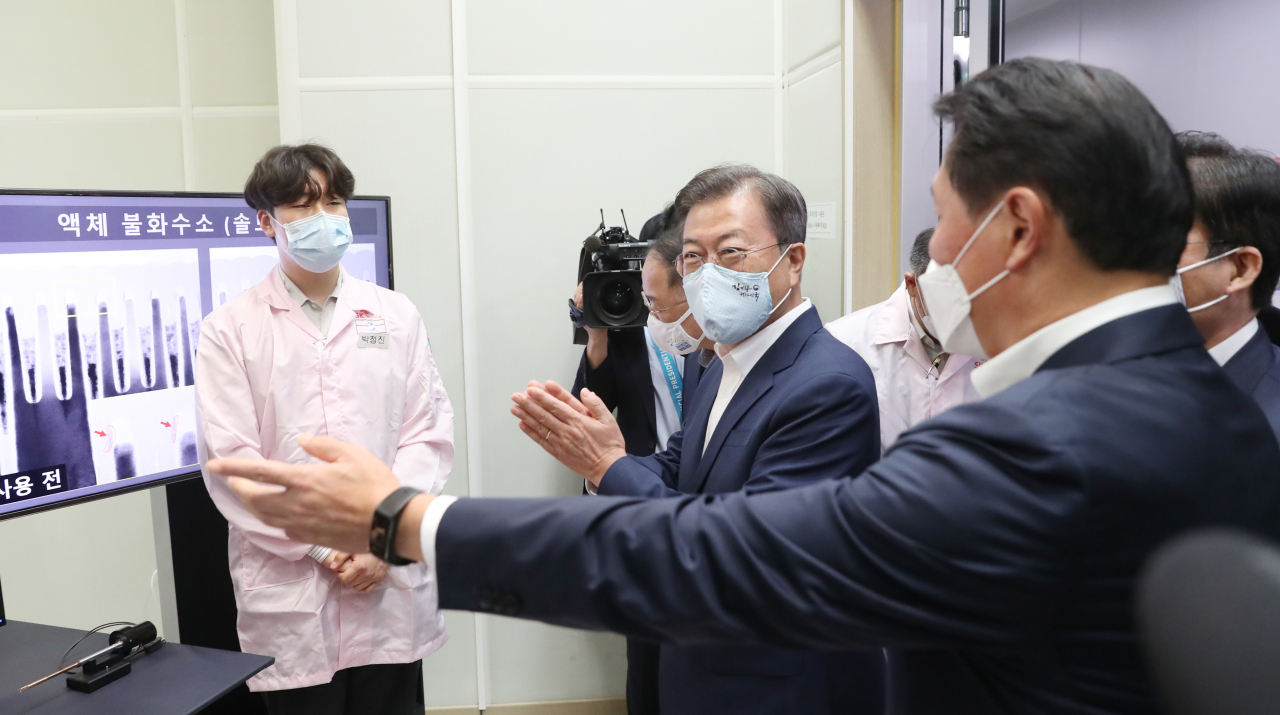 |
President Moon Jae-in tours the hydrogen fluoride manufacturing facility at SK hynix’s plant in Icheon, Gyeonggi Province (Yonhap) |
President Moon Jae-in on Thursday praised Korean industry’s progress in securing supply independence from Japan, and said he would shift his administration’s policies for the materials, components and equipment industries from a defensive to an aggressive footing in order to stabilize the global value chain.
Moon visited the nation’s second-largest chipmaker SK hynix’s plant in Icheon, Gyeonggi Province, accompanied by the SK Group Chairman Chey Tae-won, to review the progress Korea has made since Japan imposed trade restrictions on Korea a year ago.
“Japan’s unfair trade restrictions are continuing for a year. Despite the initial concerns that this would deal a significant blow to our economy, the combined forces of the government, industry and researchers have helped us overcome the crisis without a single glitch in manufacturing,” Moon said.
Having experienced the uncertainties of being dependent on the whims of trade partners, and the unexpected anomalies such as a pandemic, Korea has recognized the need to grow its own sourcing capacity -- not only for its own good but for the good of the global value chain.
“We will walk a different path from Japan. Using this crisis as an opportunity, we will make the leap to become the leader in the global materials, components and equipment industries,” said Moon.
“We will contribute to the stabilization of the global supply chain and build a symbiotic relationship with the rest of the world. This will be the ‘Korea way,’” he added.
At SK hynix’s Icheon plant, Moon toured the hydrogen fluoride manufacturing facility.
Hydrogen fluoride and fluorinated polyimides are materials Korea had relied on Japan for sourcing only a year ago, Moon said, but they can now be produced locally after the investments were made by the government and the chipmaker. He added that Korea has also doubled the capacity to manufacture another key material, hydrofluoric acid -- hydrogen fluoride in solution -- compared to a year before.
“SK hynix is the birth chamber of next-generation chips and the motor behind the localization of semiconductor’s core materials,” Moon said. “And just as our countermeasures to COVID-19 has set the world standard, we can lead in the materials, components and equipment industries.”
Korea will expand supportive policies to foster 100 leaders in materials business by 2022. The government will also inject 1.5 trillion won ($1.25 billion) over the next five years to make Korea the global manufacturing hub for cutting-edge technological products. Priorities will be on semiconductor, bio, future mobility, hydrogen and rechargeable batteries businesses, after which the scope will expand to cover electronics, automobiles and fashion.
The government said Yongin, Gyeonggi Province, would become home to a world-class chip cluster with the collective investment of 120 trillion won from SK hynix, the government and resident firms, aiming to create 17,000 jobs and generate 188 trillion won in added value.
By Lim Jeong-yeo (
kaylalim@heraldcorp.com)








